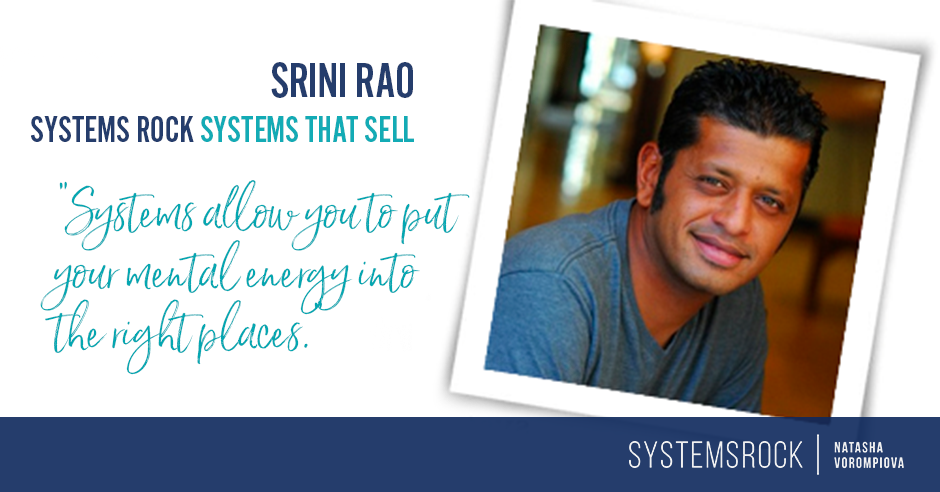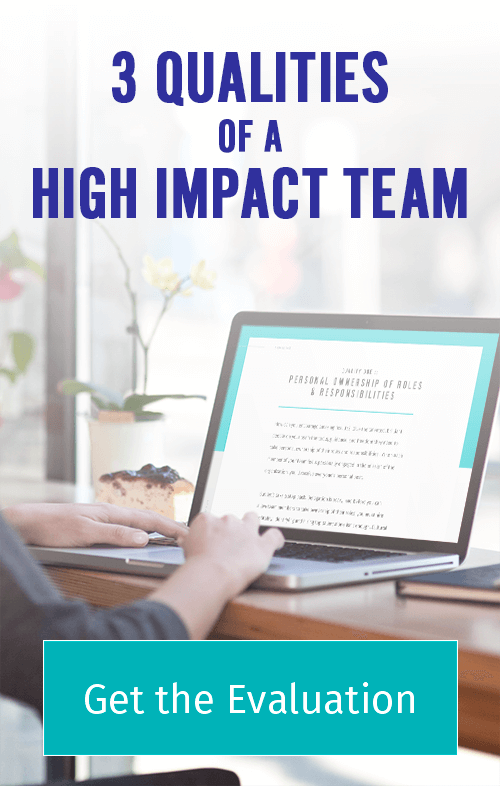Extract of the interview with Srini Rao, founder of The Unmistakable Creative, former BlogcastFM.
(First published as part of Systems That Sell series. To listen to the original interview click here)
Don’t Waste Energy on Repetitive Tasks in your
Business Systems
Natasha: Welcome Srini! The reason I wanted to speak with you is because you produce so much: you record interviews for BlogcastFM and BlogcastFM Backstage, you create an insane amount of content, you write books, you are also putting together your new event The Instigator Experience…
So, I’m assuming that all this requires serious productivity systems…
Srini: I guess… I jokingly told somebody: “If you spent a day with me, you would be really disappointed about how lazy I seem,” because I am efficient partially because I have to be; I don’t have the attention span. I can’t last for more than about two to three hours of doing sort of really deep-focused work.
So, I guess really what I should talk about is my productivity process and what my creative process looks like. Because a lot of it is dictated by “How can I do things as efficiently as possible?”
It all stems from one foundational piece, and this habit has always been there since the very beginning. I’ve built up over time, and lately, I kind of hit momentum of writing 1,000 words a day right when I wake up in the morning because I’ve found even on the days that I don’t necessarily share it, that habit has started to bleed into other areas of my life.
But the other thing is because I’ve done it so much, ideas start to connect. I might have had an idea from nine months ago and it suddenly comes about today, and that is making its way into all of my work.
It’s kind of like a seed that you’re planting in different areas, so it’s affecting BlogcastFM, it’s affecting the way I write books, it’s affecting my thought process behind our event, The Instigator Experience.
So, a lot of it comes down to discipline. The thing is that I know what absolutely needs to get done.
My daily to-do list never has any more than five items on it. And I don’t do any more than those five items either, which is why I’m done by noon most days. I do my 1,000 words in the morning; that maybe takes 30 minutes.
I know what our schedule is like for our content, which is why I was finally able to get efficient about it. The actual process is extremely repetitive, so I thought, “Well, you know what? What if I figured out, like, literally like just broke it down, what needs to get done every week?”
It was actually really interesting because then I started to see it, and I think that once you have that, that’s how you get sort of efficiency in place.
Because the thing is that here’s what was really kind of an eye-opening thing to me, and I can’t take credit from this, Greg Hartle who is my co-host on BlogcastFM Backstage told me this. He was talking to me about having checklists for the things that you do on a regular basis, and in my case, one of the things that I do regularly is editing podcasts.
Well, what goes into the production of a BlogcastFM episode?
I have to find a guest, and parts of this are creative, parts of it are not. But let’s actually focus on the part that isn’t for the sake of this because I think that’s the part that’s actually relevant right now.
Once the interview is recorded, there’s a number of steps that have to happen, but those are the same steps for every single interview; they never change. I have to:
- Edit the episode,
- Add in sponsor plugs,
- Put it in Dropbox for the virtual assistant,
- Write the WordPress show notes,
- Send them off to a virtual assistant who does that, and then
- Post it on social networks.
But what’s interesting is those things are the same with every single interview, and honestly, I need to be more disciplined about actually doing this, but this is the part that blew my mind when Greg turned me on to this idea.
He said —“You realize that the energy that you’re using to do these repetitive tasks is just—it’s the same amount of mental energy that you use for creative tasks.”
I thought, “Wow, what a waste of energy. What a waste of what could be creative energy,” which is where your real work comes from or where your deep work comes from, being put on stuff that’s repetitive.
So, we know the next BlogcastFM episode comes out Wednesday. Here is what needs to happen:
- This morning, I was doing the show notes for the Wednesday episode.
- Tomorrow, I’ll actually go through and I will cut everything that needs to be cut (the pre- and post conversations)
- Then it’ll be handed off to a virtual assistant who will set it up to be Tweeted, shared, et cetera.
- Also, Sara provides me with an album cover, is what we’re calling it, for each interview and that goes into Dropbox,
- And then that gets shared across social networks.
So, it really comes down to looking for repetitive actions. It’s funny because a lot of people will tell you this exercise, but nobody does it. Many people will say, “Oh, that sounds great,” but literally–
–just make a list of what you’ve done in a day and then see how many other days do you actually just repeat that list.
Once you do that, then you’ll start to realize that wow, you don’t actually need as much time as you think you do. That’s why I always say it’s amusing to me that people think I’m a work horse and I’m kind of like, “Yeah, if you saw what my days are like, I think you’d be a little stunned.”
Natasha: This is exactly why I reached out because I understand that you are not really spending that much time working 🙂 …How do you provide instructions to your assistant?
Srini: That’s actually a really good question. Part of it is that this is a guy who’s been with us for three to four years, so he knows our process almost to some degree better than I do. We’ve been very lucky; we’ve had this same person who basically does all this.
But what’s also important is that you really have to understand your process, and when it comes to being able to hand off something like that, you need to know step by step. And I’ve learned this the hard way.
I’ll give you an example of this that happened to me just last week. We just did our first physical product, which is a poster Principles of Creativity.
After we got the orders in, I realized, “Okay, I need to look for a different printer because, with this amount of orders, we need to adjust our printing costs somehow.”
So, I sent an email to the virtual assistant company; I said, “Hey, listen. I need to print some posters. Can you do some research for this?” But I forgot one really critical step, and so I ended up wasting hours because of this.
I forgot to tell them that I wanted it printed on poster-quality paper. Can you believe that? I had to actually specify that detail.
So, I got back all these quotes and I was very stunned. I was like, “Oh, wow. This is great. This is going to be way cheaper than I thought it was going to be to produce this.”
But it turned out that he actually had gotten quotes for just printing on regular paper, just a bigger size.
I wasted a morning at Kinko’s, I wasted multiple phone calls to people that they had said were great printers. And the truth is that that was my fault. As much as I wanted to blame them and say these guys are idiots, I left out one very specific thing, like the type of paper that it needed to be printed on. And you can’t assume that people are mind readers.
Going back to your original question, it comes down to basically saying, “Okay, step by step, what does this look like?” To make things easier for yourself, use a tool that video captures processes so you can hand them off to virtual assistants.
Natasha: Yes, Jing is a great example of such a tool.
Srini: Let me give you one other example, and I didn’t realize that I didn’t mention this, but this effectively involves a lot of outsourcing. When I produced “The Small Army Strategy” or the other book, “The Art of Being Unmistakable,” one of the things that is incredibly time-consuming, and honestly a waste of time for somebody like me, was formatting documents.
To me, it was a great lesson in letting go. I use this service called Fancy Hands, and part of why I like them is because you can get started with $25, and you can have them do really minor tasks because often, I think, that’s a big stepping stone for people is to pull themselves away from something.
So, when we did “The Small Army Strategy,” a lot of that was based on blog posts on another blog, and I found myself thinking one day: “I’m digging through the archives here, trying to find the links, copying, and pasting. Why am I doing this? I should find somebody else to do this.
I went to my assistant and said, “Okay, can you strip out all the images, strip out everything but the titles and also format the document so that it looks clean and the page breaks are all in the right places?”
They did it in five minutes what would’ve taken me two hours. Part of it was just letting go of things that honestly are difficult for me to do because I’m not good at them and are incredibly time-consuming.
Natasha: That’s a great example! Well, we touched on this earlier, and I’m not really looking for specific numbers, but how does having all the structures in place impact your profits, you think?
Srini: That’s a good question. I don’t necessarily have a great answer for you because it’s kind of a work-in-progress right now. But I can tell you this: In the last maybe two months, as I’ve become much more disciplined about this, I’m doing a lot less work and my income has increased. Better structures make a world of difference.
Part of it is that your mental energy gets put into the right places so you’re not just wasting it. Because here’s the thing: It’s very easy to feel productive when you’re actually just busy.
I think that understanding that difference is what has allowed me to create at the pace I have.
Natasha: Awesome! I agree, simple systems can majorly impact your bottom line, and at the same time, give you freedom and peace of mind. Because aren’t those the reasons we start our businesses in the first place?
Back to You
What structure affects your bottom line the most?


